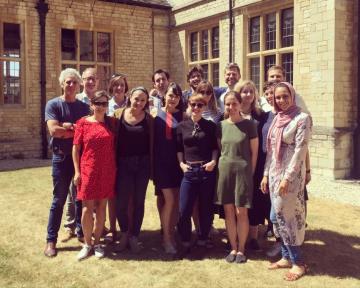This summer saw the two of us history DPhil candidates, alongside two other Oxford doctoral students, participate in the University of Notre Dame’s sixth annual Global Dome Exchange Programme. With the (slightly formidable) subtitle of ‘PhD Dissertation Accelerator’, the Programme consists of a three-week intensive workshop, designed to not only develop our own dissertations, but to foster international and interdisciplinary networks. In partnership with Oxford, Edinburgh and Heidelberg universities, Notre Dame hosted seven doctoral students from the Humanities, over three weeks: starting in Edinburgh, moving to London, and then finishing in Oxford. Guiding us through the process were Notre Dame’s Madden-Hennebry Professor of History, Patrick Griffin, and Associate Professor of English and Chief Academic Digital Officer, Elliot Visconsi.

On being accepted onto the programme, each successful candidate were to submit a draft of a chapter from our dissertation, briefly situating this work-in-progress within not only our larger project, but our disciplines. Each day of the programme saw a chapter workshop: for approximately one to two hours, a participant(s)’s paper was discussed, debated and defended. There was a strong emphasis on wide group participation, despite the vast majority of chapters from beyond our individual research areas. Chapter topics ranged from quietism in early Islam, to representations of birds in contemporary nature writing, to the role of women’s friendships with gay men in twentieth-century American literature and culture. By taking us outside the cosy confines of our own research topics, Patrick and Elliot encouraged us to think of our projects from a perspective of ‘altitude’: to stand above and away from our work; to engage in interdisciplinary discussion; to present our work clearly and compellingly to both non-expert audiences; and, crucially, to always ask ‘why does this research matter?’
Alongside chapter workshops, our daily schedule allowed for guest faculty members to present their recent research, in much the same as students- we were encouraged to pay attention to their craft, argument and research methodologies. Following discussions of their own work, guest faculty normally remained for the rest of the sessions, participating in the chapter workshop and offering feedback. These interactive and informal discussions provided a real insight into the research process, and the varied nature of academia.
Demanding as the working days were, we were strongly encouraged to enjoy some leisure time to explore the various cities we stayed in and bond as a group- often including guest faculty, as well as Patrick and Elliot. In promoting academic rigour and friendliness, the Global Dome’s approach is unique and conducive to real productivity. Research ideas and discussions were equally likely over our lunchbreak, in chapter workshops, or while nursing a pint in the evening.
If we hadn’t made it clear enough, we would both strongly recommend applying for the Global Dome to all History DPhils. Here are our top three reasons for doing so:
- Three weeks of intensive academic workshops and training really does ‘accelerate’ your thesis work and academic output: future you will be incredibly grateful when it comes to writing up.
- Students gain a multitude of perspectives on their work from scholars working within and without their own discipline. You gain a clarity of perspective.
- We have made lasting friendships and connections beyond our own field and institutions. Global Dome is a unique opportunity to both give and receive feedback from other doctoral students and academics working in the UK, European and US markets. You meet a group of remarkable graduate students, working on a range of fascinating topics, who may have a direct (or indirect) bearing on your own work. And all this while getting advice from more senior scholars.
The Global Dome Programme, has provided us with the opportunity to participate in an international, interdisciplinary and multi-level community. Michaela says: “Global Dome is, by far, the best DPhil training and interdisciplinary conference-style programme that I have had the pleasure of participating in. It gets to the very core of individual research objectives, as well as opening up unique projects to the humanities more broadly.” Beth says “the Global Dome was an invaluable experience, where I gained a stronger understanding of research skills and development, as well as the confidence to put this knowledge into practice.”
- Michaela Moriarty and Beth Kitson